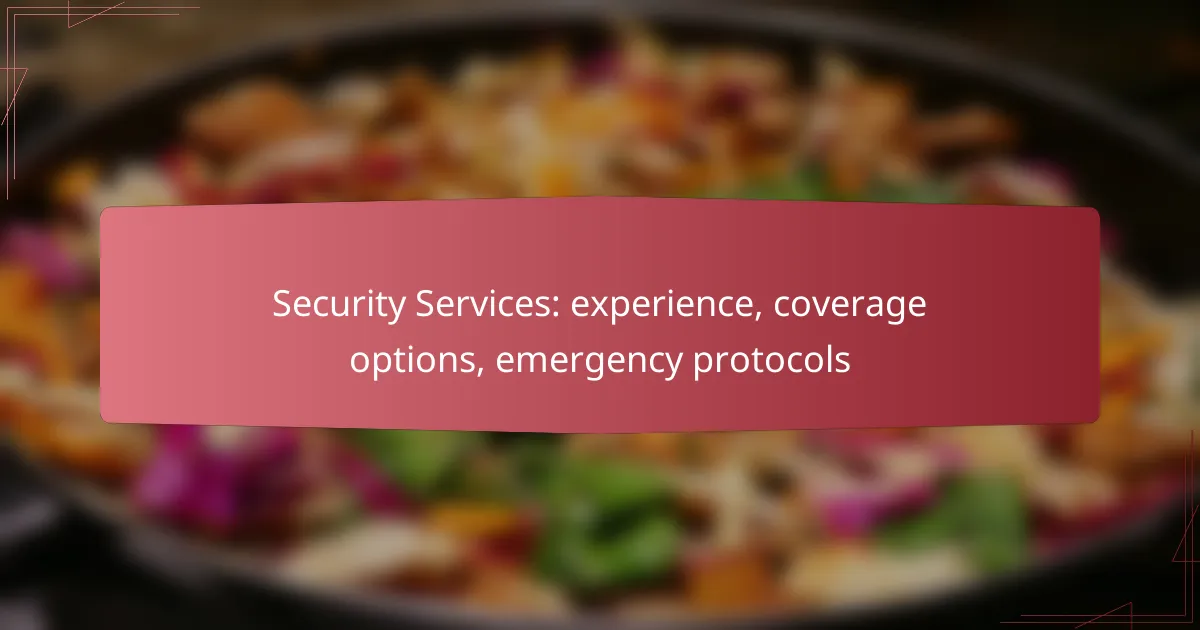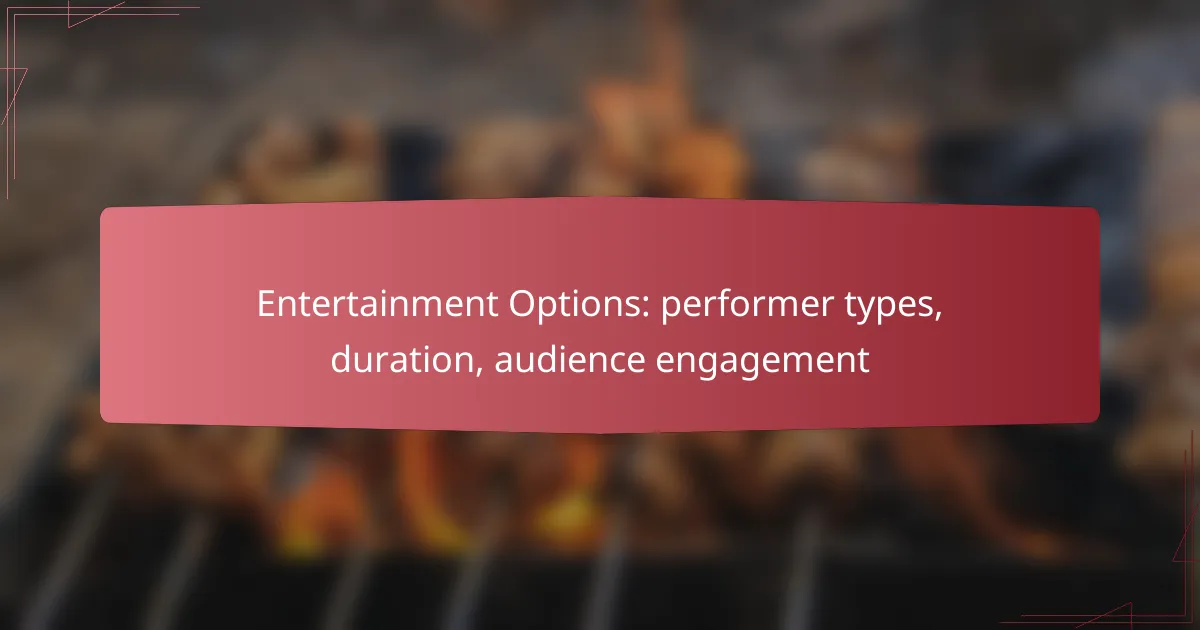In London, security services offer a comprehensive range of options tailored to meet the unique needs of residential, commercial, and event clients. With a focus on experience and industry certifications, these providers implement structured emergency protocols to ensure swift and effective responses during incidents, thereby enhancing safety and peace of mind for all. From mobile patrols to remote monitoring, clients can choose the coverage that best suits their security requirements.
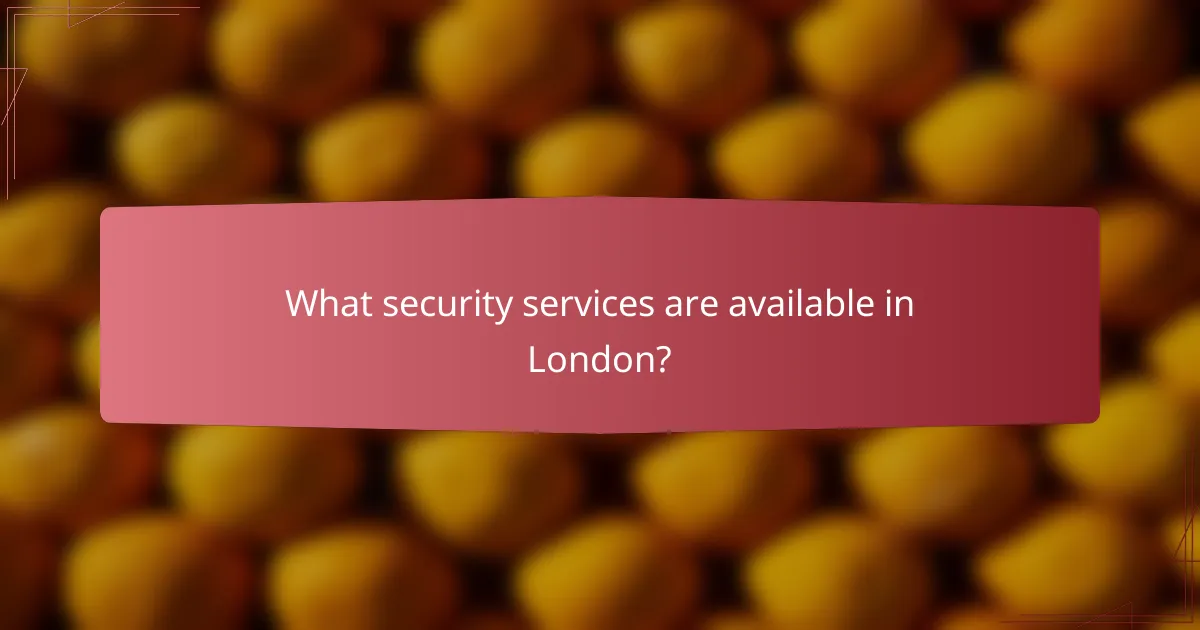
What security services are available in London?
In London, a variety of security services are offered to meet diverse needs, including mobile patrols, alarm response, on-site personnel, event management, and remote monitoring. These services cater to residential, commercial, and event security requirements, ensuring safety and peace of mind for clients.
Mobile patrol services
Mobile patrol services involve security personnel conducting regular checks in vehicles across designated areas. This approach deters criminal activity and provides a visible security presence. Clients can expect patrols at scheduled intervals or on-demand, depending on their specific needs.
When considering mobile patrols, assess the coverage area and frequency of visits. Many companies offer customizable plans, allowing clients to choose between daily, weekly, or even hourly patrols based on their security concerns.
Alarm response services
Alarm response services are designed to react quickly to triggered alarms, ensuring prompt investigation and action. Typically, a security team is dispatched to the location within minutes to assess the situation and take necessary measures.
It’s crucial to choose a service that guarantees rapid response times, ideally within 10 to 20 minutes. Additionally, ensure that the service provider has a clear protocol for dealing with false alarms to minimize unnecessary disruptions.
On-site security personnel
On-site security personnel provide dedicated protection at specific locations, such as offices, retail stores, or events. These guards monitor premises, control access, and respond to incidents on-site, enhancing overall security.
When hiring on-site personnel, consider their training and experience, as well as the specific security needs of your location. Options may include unarmed guards for general monitoring or armed personnel for higher-risk environments.
Event security management
Event security management focuses on ensuring safety at gatherings, from corporate functions to large public events. This service includes planning, risk assessment, crowd control, and emergency response strategies tailored to the event’s scale and nature.
For effective event security, engage a provider early in the planning process. Discuss potential risks, expected attendance, and specific security measures needed, such as bag checks or access control to restricted areas.
Remote monitoring solutions
Remote monitoring solutions utilize technology to oversee properties from a distance, often through CCTV and alarm systems linked to monitoring centers. This allows for real-time surveillance and immediate alerts in case of suspicious activities.
When selecting remote monitoring services, evaluate the technology used, including camera quality and software capabilities. Many providers offer 24/7 monitoring with options for live feeds, recorded footage, and integration with alarm systems for comprehensive security coverage.
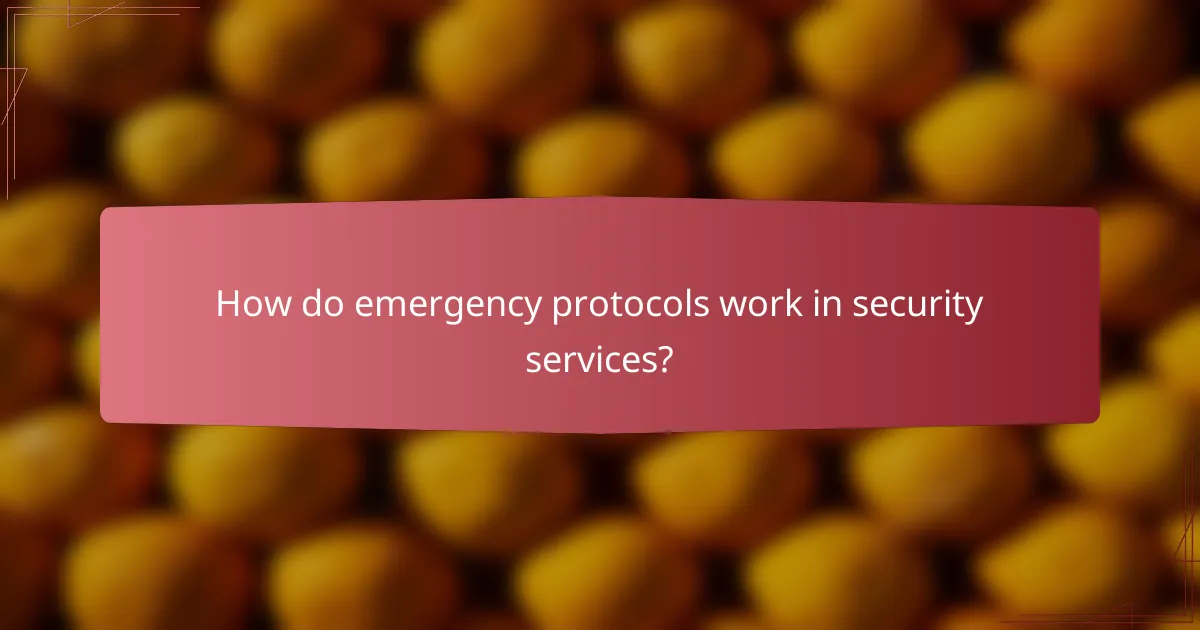
How do emergency protocols work in security services?
Emergency protocols in security services are structured plans that outline the steps to take during various incidents, ensuring a swift and effective response. These protocols are designed to minimize risks, protect individuals, and maintain order during emergencies.
Immediate response procedures
Immediate response procedures are the first actions taken when an emergency occurs. These often include assessing the situation, notifying relevant authorities, and implementing safety measures to protect individuals on-site. Security personnel are typically trained to act within seconds, prioritizing the safety of people and property.
For example, in the case of a fire alarm, security staff may initiate evacuation procedures while simultaneously contacting emergency services. It is crucial that these procedures are rehearsed regularly to ensure all team members are familiar with their roles.
Communication protocols during incidents
Effective communication is vital during emergencies to ensure that all parties are informed and coordinated. Security services often utilize two-way radios, mobile phones, and public address systems to relay information quickly. Clear communication helps prevent panic and ensures that instructions are understood and followed.
Establishing a chain of command is essential; designated individuals should be responsible for relaying information to both security personnel and emergency responders. Regular training on communication protocols can enhance clarity and efficiency during actual incidents.
Evacuation plans
Evacuation plans outline the procedures for safely exiting a building or area during an emergency. These plans should include designated exit routes, assembly points, and procedures for accounting for all individuals. Regular drills help ensure that everyone knows how to respond in case of an emergency.
It’s important to consider accessibility in evacuation plans, ensuring that individuals with disabilities have clear and safe routes. Additionally, signage indicating exits and assembly points should be clearly visible throughout the premises to aid in quick evacuations.
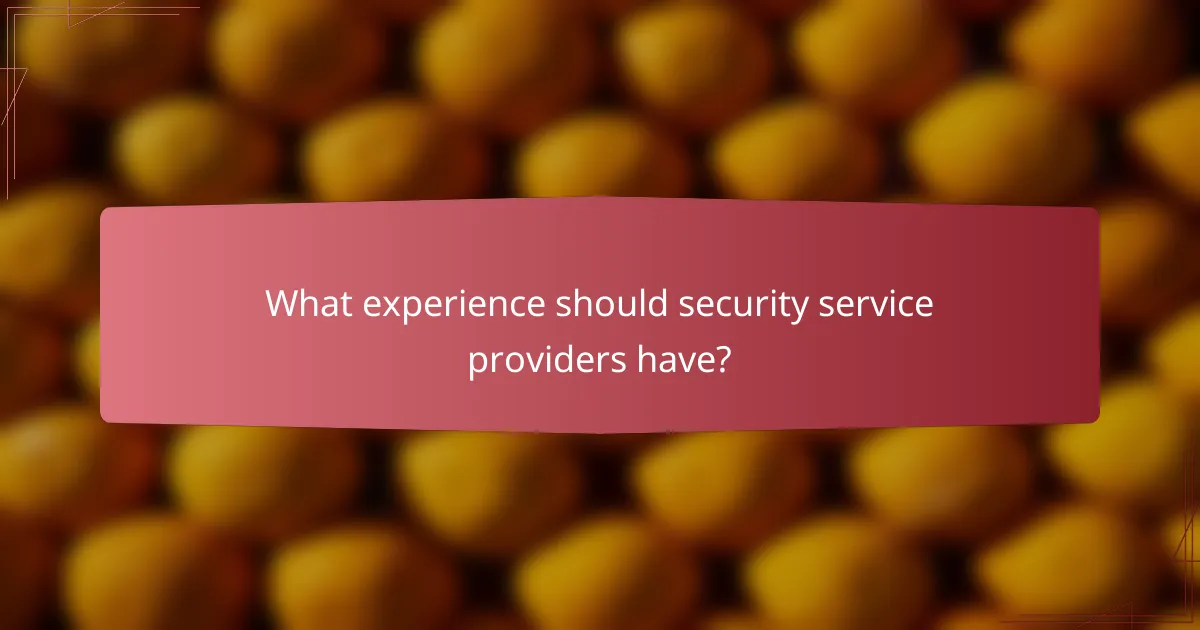
What experience should security service providers have?
Security service providers should have a solid foundation of experience that includes industry certifications, years of operational experience, and positive client testimonials. This combination ensures they are equipped to handle various security challenges effectively.
Industry certifications
Industry certifications are essential indicators of a security provider’s expertise and commitment to best practices. Look for certifications such as Certified Protection Professional (CPP), Physical Security Professional (PSP), or Security+ from CompTIA. These credentials demonstrate that the provider adheres to recognized standards and has undergone rigorous training.
Additionally, check if the provider is compliant with local regulations and standards, which may vary by country. For example, in the EU, compliance with the General Data Protection Regulation (GDPR) is crucial for security services handling personal data.
Years of operational experience
Years of operational experience can significantly influence a security provider’s effectiveness. Aim for providers with at least five years in the industry, as this typically indicates a proven track record in managing diverse security scenarios. More experienced providers are likely to have encountered and resolved a wider range of security issues.
Consider the specific areas of expertise as well. For instance, a provider with extensive experience in corporate security may not be the best fit for residential security needs. Tailor your choice based on the type of security services required.
Client testimonials and case studies
Client testimonials and case studies provide valuable insights into a security provider’s performance and reliability. Look for reviews that highlight the provider’s responsiveness, professionalism, and ability to handle emergencies. Positive feedback from clients in similar sectors can be particularly telling.
Request case studies that detail specific challenges the provider has faced and how they addressed them. This information can help you assess their problem-solving capabilities and the effectiveness of their security protocols. Aim for providers who can demonstrate measurable success in improving security outcomes for their clients.
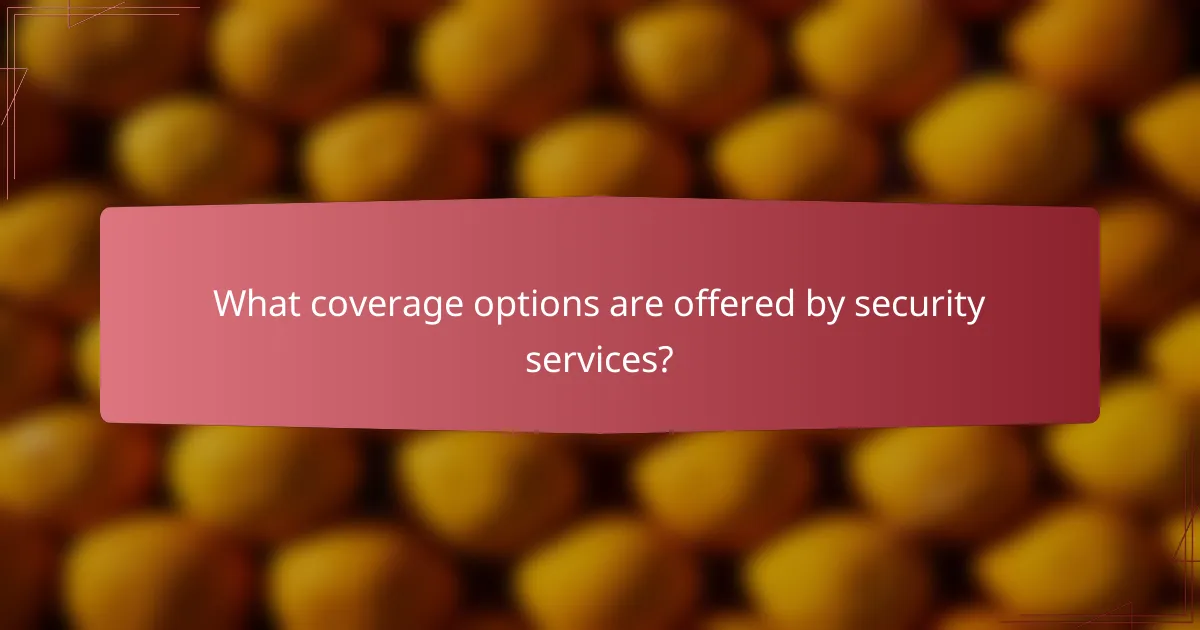
What coverage options are offered by security services?
Security services typically offer a variety of coverage options tailored to meet different needs. These options include 24/7 coverage plans, customizable service packages, and geographic coverage areas that can adapt to specific client requirements.
24/7 coverage plans
24/7 coverage plans provide round-the-clock security, ensuring that clients are protected at all times. This option is ideal for businesses and properties that require constant monitoring due to high-value assets or sensitive operations.
When selecting a 24/7 plan, consider the level of surveillance needed, such as on-site security personnel or remote monitoring through cameras. Many providers offer tiered plans, allowing clients to choose the extent of coverage based on their budget and security needs.
Customizable service packages
Customizable service packages allow clients to tailor their security solutions based on specific requirements. These packages can include a mix of services such as armed or unarmed guards, alarm systems, and access control measures.
Clients should assess their unique risks and operational needs when designing a package. For instance, a retail store may prioritize theft prevention, while a corporate office might focus on employee safety and access management.
Geographic coverage areas
Geographic coverage areas determine where security services can be effectively deployed. Many security companies operate within specific regions, which can influence response times and service availability.
Clients should verify that their chosen provider can cover their location adequately. For example, urban areas may have more options for immediate response, while rural locations might require longer travel times for security personnel. Understanding these geographic limitations is crucial for effective security planning.

What are the costs associated with security services in London?
The costs for security services in London can vary significantly based on factors like the type of service, duration, and personnel required. Generally, businesses should expect to budget for both fixed and variable costs, which can range from hourly rates to long-term contracts.
Hourly rates for on-site personnel
Hourly rates for on-site security personnel in London typically range from £15 to £30, depending on the level of expertise and the nature of the assignment. For instance, unarmed guards may charge less than those with specialized training or armed security personnel.
When hiring security staff, consider the specific requirements of your event or property. Factors such as location, time of day, and the risk level can influence rates. For example, night shifts or high-risk areas may incur higher charges.
It’s advisable to compare quotes from multiple security firms to ensure competitive pricing. Additionally, inquire about any hidden fees, such as travel costs or equipment rentals, that may affect the overall budget.
